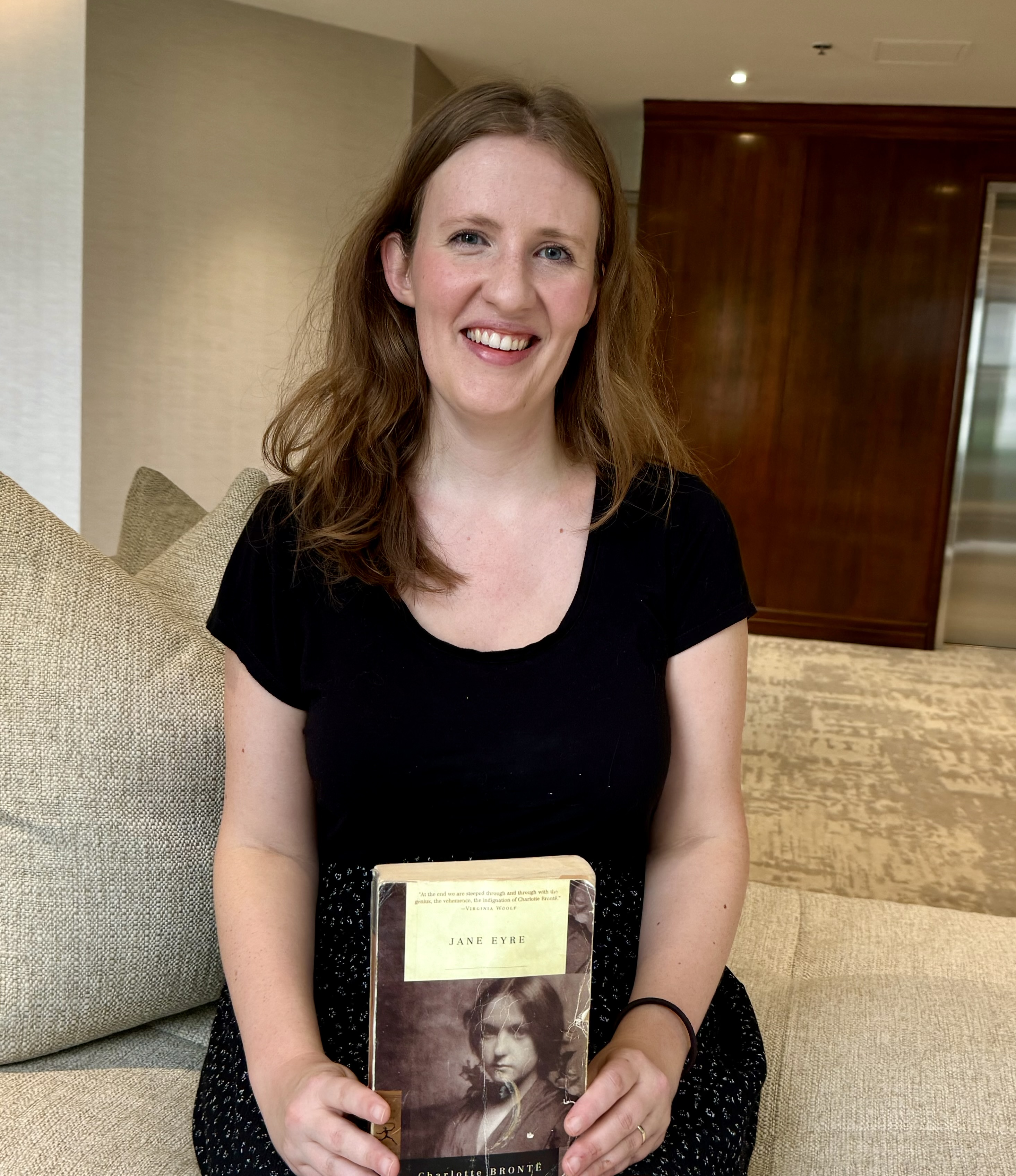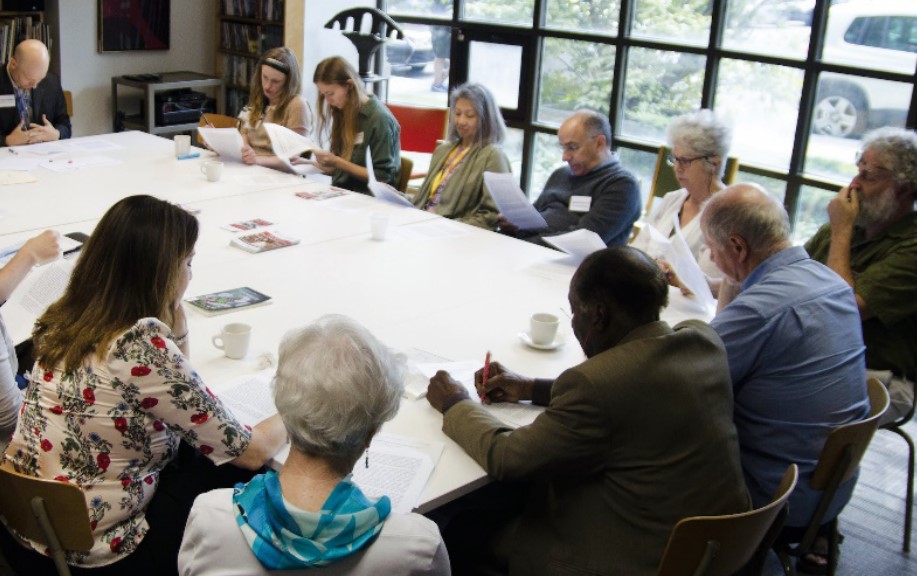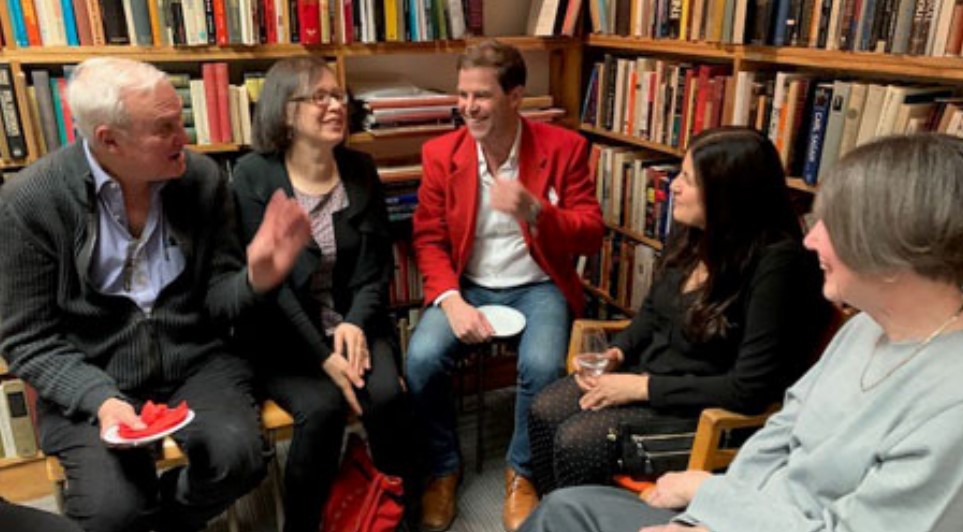Anatomy of a Course Design: Jane Eyre and Her Heirs
Charlotte Boatner-Doane
By Dominic Varvaro, Fall 2024

Prompted to think of TMI course designs in anatomical terms, I immediately zero in on the brain and the heart. In my interview with Charlotte Boatner-Doane about her upcoming course, Jane Eyre and her Heirs, it is clear that the impetus for the course comes from her heart, but that the working through of the design involved lots of brain-work—from initial curiosity to thorough research to the imaginative leaps required in bringing together in conversation seemingly disparate works.
When I first talked to Charlotte to arrange a time and place for this interview, Charlotte asked if she should bring anything. I didn’t think she needed to, but suggested she bring in her copy of Jane Eyre, thinking we might want to look up a passage or quotation. I’m so glad she did.
I start the interview with “Why Jane Eyre?” Charlotte responds by pulling out her copy of the book. I needn’t have asked the question. The physical book immediately shows me that this course springs from love. Her copy of the book is well-worn, the cover has been torn and taped over many times, and the pages are thoroughly thumbed. There is a dedication on the inside cover written by her father when he gave her the book, her “first grown-up book,” 20 years earlier.
Jane Eyre is Charlotte’s favourite book. After reading and rereading and rereading it, she started to become interested in the afterlife of Jane Eyre in popular fiction. Charlotte started to think about designing a course that would include novels that are in conversation with Jane Eyre. As is so common with TMI course designs, the idea for the course had been percolating in her brain (and heart) for a long time.
When Jane Eyre was published, it was met with some praise, but with more moral outrage (stemming from fear?) because Jane behaves un-Christianly (she speaks critically to a preacher), and rebels against prevailing gender and class structures. Social class is important in this novel. Jane is an orphan; she has to work for a living. Her outspokenness was seen by many nervous upper-class critics as a reflection of the class revolts occurring in society at the time.
Charlotte explains the phenomenon of Jane Eyre-inspired novels (there are lots of them!) as having several motivations; the first is the continuing relevance of class and gender issues today. Another is simply that people still really like Gothic novels, especially ones with big houses and madwomen in an attic. What is unique about this Gothic novel is the voice of its protagonist. Jane is a strong proto-feminist character who stands up for herself and demands a rich life of her own.
When I ask Charlotte how she chose the three specific “afterlife” novels she wanted to include, she says simply that she liked these three the best. She deliberately included only one other Gothic novel (Rebecca), in order not to overdo the gothic aspect. The three novels speak to Jane Eyre in very different ways, making for a richer course design, and ideally leading to more vibrant and varied course discussions.
I ask Charlotte whether she feels these later novels do justice to Jane Eyre. She responds in a way that suggests this is not the right question. She says, “They do something different.” Wide Sargasso Sea gives the “madwoman in the attic” a voice. In Jane Eyre, this character is portrayed unsympathetically. She is often seen by critics as a representation of Jane’s inner rage at her social situation. Jean Rhys rewrites this compelling character with sympathy, portraying her madness as a consequence of her having been displaced from her home in the Caribbean. Oranges Are Not the Only Fruit is very different, but like Jane Eyre, it is a coming-of-age story that speaks to Bronte’s deep interest in relationships between women.
As in all TMI courses, supplementary readings are an essential feature, and finding appropriate ones takes a lot of research. Charlotte explains how she looked for the readings she selected, first by going back to the source book, Jane Eyre. She looked at articles about Bronte, about what she would have been reading, where her inspirations may have come from. When looking for material to support the later novels, Charlotte used a mixture of looking for specific ideas (e.g., articles that touched on her hunch that there were interesting, but not obvious, connections to be made between Jane Eyre and Oranges) and being open to serendipity, to finding articles that spoke to connections she hadn’t thought of.
Charlotte’s visible love for Jane Eyre, and enthusiasm for the way Bronte’s work still lives on today, have combined with her intellectual curiosity to create a fascinating and compelling course design. This will lead undoubtedly to a wonderful and exciting course.

